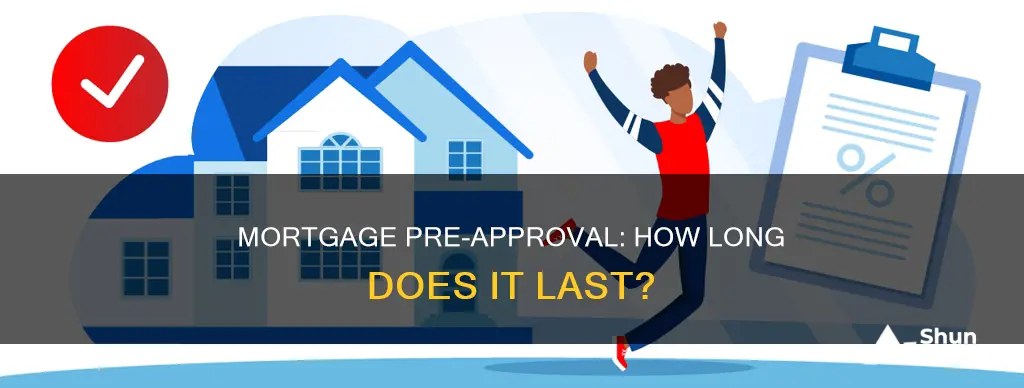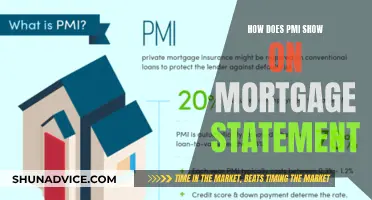
Getting a mortgage pre-approval is an important step in the home-buying process. It involves a detailed evaluation of your finances, including a hard credit check, to determine how much you can borrow for a home purchase. While the process can take a few days to a week or longer, the pre-approval is typically valid for around 90 days, but it's essential to start the process when you're actively house hunting to avoid expiration. This guide will explore the steps and timing involved in obtaining a mortgage pre-approval, helping you navigate the complex world of real estate with confidence.
| Characteristics | Values |
|---|---|
| Time taken for pre-approval | 1-10 business days |
| Time taken for pre-qualification | Within an hour |
| Validity of pre-approval | 30-90 days |
| Documents required for pre-approval | W-2, pay stubs, bank statements, tax returns, proof of income, employment, assets |
| Credit score requirement | 620 or higher |
| Down payment | 15-20% |
| Pre-approval process | Submit a mortgage application, credit history check, financial standing check, review income and assets |
What You'll Learn

Pre-qualification vs pre-approval
When you want to buy a home, you may be asked to get prequalified or preapproved for a mortgage. These are both types of mortgage approval that refer to steps that lenders take to verify that a client can afford a mortgage. However, they differ in several ways.
Prequalification
Prequalification is an early step in your homebuying journey. It is a quick process that can be done online, in person, or over the phone in just a few minutes. You will need to provide basic financial information, such as your income and expected down payment. The lender will then give you a preliminary estimate of how much you can borrow. Prequalification can be useful for first-time homebuyers who are establishing their homebuying budget and want an idea of how much they might be able to borrow. It is also a good opportunity to learn about different mortgage options and work with your lender to identify the right fit for your needs and goals.
Preapproval
Preapproval is a more detailed evaluation of your finances. It is a more specific estimate of how much you could borrow and requires documentation such as your W2, tax returns, pay stubs, and bank statements. The lender will also perform a credit check. The preapproval process typically takes a few days, and you should receive your preapproval letter within 10 business days after you have provided all the requested information. Preapproval is a smart step to take when you are ready to put in an offer on a home as it shows sellers that you are a serious buyer. It also gives you a competitive edge over other buyers in the market.
Preapproval is usually valid for 90 days, but it can also be valid for 30, 60, or 90-120 days depending on the lender, your credit, and other factors.
Understanding Default: The National Mortgage Association's Definition and Implications
You may want to see also

When to get pre-approval
The best time to get pre-approved for a mortgage is when you are actively house hunting, but not so far in advance that your pre-approval expires. Pre-approval is a more thorough evaluation of your finances than pre-qualification and usually lasts for 90 days, but it can also be valid for 30 or 60 days. It involves a hard credit inquiry and a detailed look into your financial profile, including your income, assets, liabilities, and credit score.
You should start the pre-approval process less than four months before buying a house. This timing will help ensure that you find the right home, negotiate the purchase, secure mortgage approval, and close on time without surprises or delays. Getting pre-approved for a mortgage before you start viewing homes to buy is generally a good idea. It will give you a good idea of what you can afford and help you narrow your home search to properties within your budget. It will also show sellers that you are a serious buyer, increasing the likelihood of your offer being selected.
To get pre-approved, you will need to submit a mortgage application and provide proof of income, employment, and assets. The lender will verify the information you provide and perform a credit check. The pre-approval process typically takes a few days to a week or longer, depending on the lender. Once complete, you will receive a pre-approval letter, which is an offer to lend you a specific amount. This offer is usually valid for 90 days, but it can depend on the lender and other factors.
It is important to note that a pre-approval letter is not a guarantee of a mortgage. It is also not advisable to wait several weeks between applications as it can impact your credit score. Instead, it is better to shop around with multiple lenders at once to find the best terms and services for your needs.
Renewing Your Mortgage Early: Is It Worthwhile?
You may want to see also

How long pre-approval lasts
The pre-approval process for a mortgage typically takes a few days to complete. It involves a thorough evaluation of your finances, including a hard credit inquiry and a review of documents such as proof of employment, income tax returns, and assets. Most mortgage pre-approvals are valid for around 90 days, but some may be valid for shorter periods, such as 30 or 60 days. This means that the entire pre-approval process, from application to expiration, can last for 3 to 4 months.
It is important to note that the pre-approval process may vary depending on the lender and other factors. Some lenders may take longer to review your application and financial reports, which can extend the overall timeline. Additionally, maintaining a good credit score and avoiding significant changes to your credit history during the pre-approval process is crucial, as any changes can impact the terms of your mortgage pre-approval.
The best time to seek pre-approval is when you are actively house hunting but not too far in advance, as you don't want your pre-approval to expire before you find your dream home. Starting the home search one to four months before you plan to close is generally recommended. This allows enough time to find the right property, negotiate the purchase, secure mortgage approval, and finalise the deal without surprises or delays.
While pre-approval enhances your credibility as a buyer, it is not a guarantee that you will get the mortgage. It is a more advanced step than pre-qualification, which is a lender's preliminary estimate of how much you can borrow based on self-reported financial information. Pre-approval indicates that the lender has conducted a detailed analysis of your finances and is confident in your ability to repay the loan.
Jared Vennett's Guide to Modern Mortgages Explained
You may want to see also

What pre-approval entails
Mortgage pre-approval is a more thorough evaluation of your finances than pre-qualification. It involves a detailed look into your financial profile as a mortgage candidate. The pre-approval process is a critical step in the home-buying journey. It helps determine your borrowing ability and gives you a competitive edge over other buyers.
During the mortgage pre-approval process, a lender will conduct a hard credit inquiry and examine various financial documents. These include proof of employment, income tax returns, pay stubs, W-2 statements, bank statements, and assets. They will also look at your liabilities and credit score to determine the amount you can afford to spend. This process helps the lender understand your financial health and whether you can comfortably afford the monthly mortgage payments.
To get pre-approved, you will need to submit a mortgage application and provide detailed financial information. This includes recent pay stubs, W-2 statements, tax returns from the past two years, bank statements, and investment account summaries. The lender will use this information to assess your financial situation and determine the specific loan amount you qualify for.
The result of the pre-approval process is a mortgage pre-approval letter, which outlines the maximum loan amount, expected interest rate, and terms of the loan. This letter is typically valid for around 90 days but can also be valid for 30 or 60 days, depending on the lender. It is important to note that pre-approval does not guarantee that you will get a mortgage, but it strengthens your offer and clarifies your budget.
Calculating Mortgage Rates: Understanding Your Costs
You may want to see also

Pre-approval vs approval
When you want to buy a house, you may be asked to get prequalified or preapproved for a mortgage. It is important to understand the difference between the two.
Prequalification is a quick process that can be done online, over the phone, or in person. It is an early step in your homebuying journey, giving you an estimate of what you might be able to borrow based on information you provide about your finances, as well as a credit check. It is also an opportunity to learn about different mortgage options and work with your lender to identify the right fit for your needs and goals. Prequalification can be useful for narrowing down lenders and establishing a general range of home prices.
Preapproval, on the other hand, is a more thorough evaluation of your finances. It is a more specific estimate of what you could borrow from your lender and requires documents such as your W2, tax returns, pay stubs, and bank statements. Lenders will also perform a hard credit check to verify your creditworthiness. The preapproval process will typically take a few days to complete, and you should receive your preapproval letter within 10 business days. Preapproval gives you a more concrete understanding of your budget, so you can start making offers. It also signals to the seller that you are a serious buyer and can make a competitive offer.
It is important to note that neither prequalification nor preapproval guarantees you a loan. Preapproval is usually valid for around 90 days but can also be valid for 30 or 60 days, depending on the lender.
Mortgage Rates: Impacting Your Monthly Payment Costs
You may want to see also
Frequently asked questions
Pre-qualification is a lender's estimate of how much you could borrow, based on basic information like your income and expected down payment. Pre-approval, on the other hand, is a more detailed evaluation of your finances, including a hard credit check and a review of documents such as proof of employment, income tax returns, and assets.
Mortgage pre-approval typically lasts between 1 and 4 months, with most lenders offering validity for around 90 days. However, some pre-approvals are valid for as little as 30 days or as long as 60 days.
It is recommended to get pre-approved for a mortgage when you are actively house hunting but not too far in advance, as you don't want your pre-approval to expire while you're still shopping. Ideally, you should start the pre-approval process 1 to 4 months before buying a home.
The pre-approval process can take anywhere from a few days to a couple of weeks, depending on the lender. It involves submitting financial documents, such as W-2s, pay stubs, bank statements, and tax returns, and typically requires a hard credit check.







